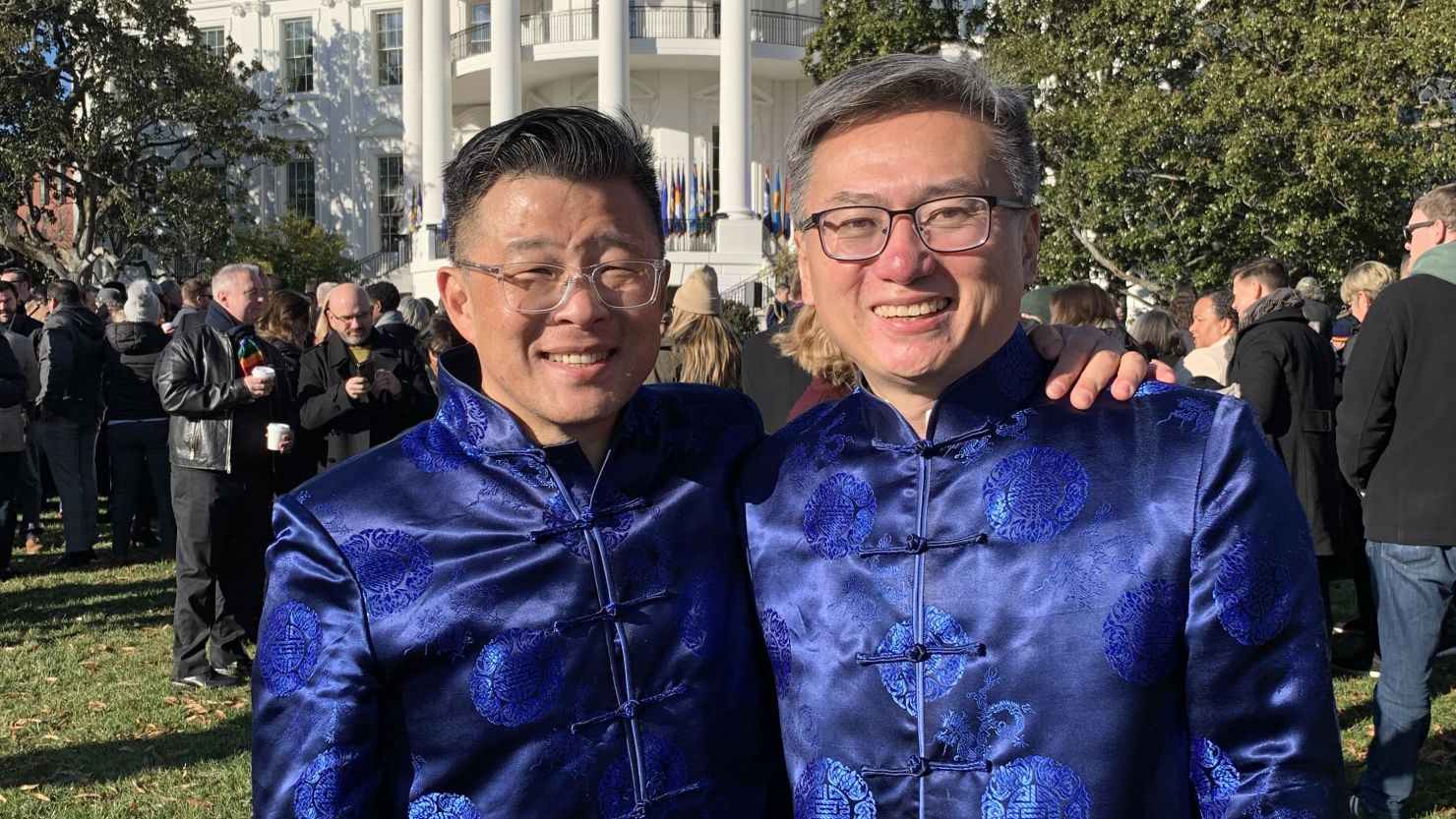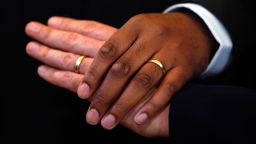Editor’s Note: Curtis Chin, a co-founder of the Asian American Writers’ Workshop, is a filmmaker and author of the forthcoming memoir, “Everything I Learned, I Learned in a Chinese Restaurant.” He was director of outreach for the Democratic National Committee and served on President Barack Obama’s Asian American Leadership Committee during his 2008 campaign. The views expressed here are his own. Read more opinion on CNN.
My husband, Jeff, and I have been together for nearly three decades. During this time, we’ve been invited to a lot of weddings. We bring nice gifts!
While each invitation has been joyfully received, none has been as impactful as the email we got last week. The upcoming ceremony to be held in our nation’s capital was not just about two individuals but spoke to the commitment of a country to its citizens – and to what more is needed to make that commitment fully worthy of an all-out celebration.
December 13, 2022, is a date to be remembered for generations: the day President Joe Biden signed the Respect for Marriage Act, a bipartisan bill affirmatively recognizing and protecting marriages of same sex couples and of interracial couples at the federal level, a feat that seemed impossible only a few years ago. My husband and I were among the lucky guests invited to witness this historic signing held in the vastness of the White House’s South Lawn.
The festive gathering certainly felt like a real nuptial. The atmosphere was electric. People came in from all over the country. We flew in from Los Angeles on a redeye. We reconnected with friends whom we hadn’t seen in person for years, heard great music, courtesy of Cyndi Lauper and Sam Smith and strained our necks to see the VIPs who had shown up. Most importantly, hope for a better future was in the air. All were there to celebrate (yes, they even played Kool & The Gang’s wedding staple).
Standing in the cold and listening to the President discuss his own journey on the issue of same-sex marriage made me reflect on what Jeff and I have been through in our relationship. Like all couples, we’ve had our share of ups and downs (dealing with finances and family, figuring out where to live, even establishing the timeline for when we first met). While we’ve done our best to navigate these common struggles, as a queer couple, we’ve faced additional challenges imposed by our own government.
The first came in 2008. During that election cycle, I was so busy serving on Barack Obama’s Presidential campaign to help elect our nation’s first bi-racial president that I didn’t pay enough attention to Proposition 8, an initiative to limit the definition of marriage in the California constitution to heterosexual couples, especially since the polling looked like it was going to fail. Then in the fall, when proponents began scaring suburban moms with ads about the threat to their children, suddenly, we began to fear what if.
Out of growing concern, Jeff and I held a shotgun wedding at the office of a public official we knew, attended only by his sister and young nephew and one of our closest friends. While we were happy to be able to tie the knot, we weren’t celebratory. We didn’t even go out for lunch.
When Prop 8 narrowly passed the following week, out of respect for our friends and community who had suddenly lost that right, we cancelled any thought of having a more public reception or ceremony. No big Chinese wedding banquets for us.
Outside of our immediate family and circle of friends, we told very few people about our changed relationship status. As our marriage stayed hidden in the closet, we still had to navigate a whole bunch of other things affected by government policy like hospital visits, taxes, and inheritance. Things came to head when we began exploring starting a family through the foster care and adoption system, only to face hurdles and disapproving judgment from a government case worker assigned to us. (I will save those gory details for another essay.)
When the US Supreme Court decided the landmark case of Obergefell v. Hodges in 2015 guaranteeing the right to marriage for same-sex couples, we cheered. Finally, our government was being held accountable about the full meaning of justice for all. We were safe because we, our friends and the rest of the community now had court precedence on our side. And we became confident enough to come out as husbands. So many people were surprised to hear that we were legally wed. Still no gifts, but hey, we were happy just for the warm smiles.
Life was good. Our families steadily grew to accept our marriage. We even sorted out the issue of how to present ourselves in tax returns.
But, this summer, when the US Supreme Court ‘s Dobbs v. Jackson Women’s Health Organization decision overturned Roe v. Wade, it threw the concept of precedent out the door, immediately threatening rights that had been considered settled by the Court decades ago as well as ones more recently established. The longest-serving member of the Court, Justice Clarence Thomas, made this crystal clear in his concurring opinion, stating that in “future cases, we should reconsider all of this Court’s substantive due process precedents, including Griswold, Lawrence and Obergefell.”
We were left unsettled. We started to wonder again, what if.
Thankfully, the Respect for Marriage Act that Biden signed gives Jeff and me, and others like us who are already married or live in states where same-sex marriage is politically relatively safe, security from people who have no business in our relationship, those who are trying to deny us the benefits that they take for granted. As we get older, this law gives us peace of mind to focus on the things that matter: preparing for our future and retirement, taking care of parents, thinking about our nieces’ and nephews’ futures and so on.
But, while this law is important, we – once again – can’t quite fully celebrate. Like most weddings, after the celebration, the hard part of the relationship begins. This bill protects us at the federal level and for federal benefits, but if Thomas and the court’s far-right majority do “reconsider” the cases that establish rights to privacy, contraception and same-sex marriage, individual states (some of which have leaders who have expressed a clear interest in doing so) could be able to discriminate in how they define marriage, forcing residents who want to recognize their same-sex relationship through marriage to turn to states that don’t discriminate. Just like women now have to do for their reproductive choices because of Dobbs. Only once we have firmly guaranteed that every American has the right to marry whom they choose – regardless of sexual orientation – can we fully celebrate. Until then, we must continue to fight.


